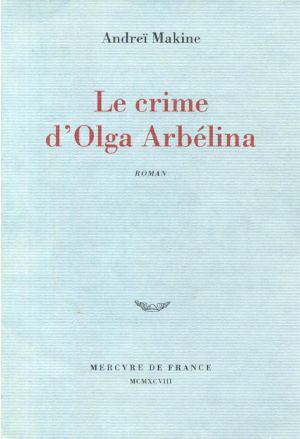Le crime d'Olga Arbelina

- Authors
- Makine, Andreï
- Publisher
- Penguin Books
- Tags
- roman
- ISBN
- 9780140298420
- Date
- 1988-07-01T00:00:00+00:00
- Size
- 0.40 MB
- Lang
- fr
**Tea and Sympathy**
Andreï Makine's third novel begins with a scene lurid enough to headline a ten o'clock news show. On a hot July morning in the summer of 1947, two bodies wash up on a dust-caked riverbank in the provincial village of Villiers-La-Forêt. It is an unlikely pairing. The woman is the princess Olga Arbyelina, a Russian émigré of astonishing beauty. She is barely alive. The man, Sergei Golets, is a retired horse butcher -- ugly as she is gorgeous and very much dead. The sordid spectacle disrupts the tiny village's peacetime torpor and gives its denizens a tantalizing glimpse of the unimaginable. But the story does not end there. For in spite of her repeated confessions, Sergei Golets's death is not Olga Arbyelina's crime.
With Proustian relish, *The Crime of Olga Arbyelina* works backward in time, peeling away history like so many layers of onion skin to reveal Olga's true crime. Like Makine's celebrated previous novels, *Dreams of My Russian Summer* and *Once, Upon a River Love*, the events recounted here are seen through the gauzy film of memory. Olga is a casualty of history: Her father was killed in the Russo-Japanese war; her mother thereafter consumed by grief. Olga barely survives her teenage years and is brutally raped during the First World War. She emerges an adult, yet a cultural refugee. Despite a fortuitous marriage to a dashing prince and a new life in Paris, she will always feel that life is to "be a solemn and melancholy wake for the past." (Makine, who is Russian and now lives in France and writes in French, powerfully evokes what it means to be caught between two cultures.)
War strikes in 1939, and Olga, abandoned by her husband, flees Paris. She settles in Villies-La-Forêt, and gradually falls into a rhythm of daily rituals to salve the wounds of her past. She works at a local library and delights in "delicious idleness." She quells her nightmares with a special herbal tea. She becomes so lost in these rituals, though, that she neglects her son -- a hemophiliac remarkable, at the time, by surviving into his teenage years. He is her symbolic center, embodying both her receding past and a future that seems, like his imminent death, a foregone conclusion. One day, Olga realizes that he is no longer a boy but a young man. Looking up into her grim apartment she notices him standing over her cooling tea with the air of someone committing a crime. Gradually, Olga makes the connection between his gesturing and the druglike efficiency of the tisane. She conducts a vigil to learn the purpose of his curious behavior and winds up accomplice to a trespass no culture would allow.
At first, Olga is paralyzed by the strangeness of it all. After a few nights, however, she finds herself looking forward to his nocturnal visits and willingly plays along. She is lonely, and this is perhaps the last winter of her son's life. It could be his only chance for love, and with her beauty fading, perhaps hers as well. Each night she brushes the drug off her tea and awaits his shadow in the doorway, feigning sleep during his furtive lovemaking. The shame of it is crushing. "Criminal was the silence she had kept. Her acceptance. Her resignation." Through the long winter she enacts a role perversely analogous to that of the goddess Demeter's: "sleeping" away the winter so that her son can have the spring of his sexual awakening. When winter turns to spring, though, their stolen season is brought to light. Olga, terrified by the prospect of their secret spreading, submits to her blackmailing neighbor, Sergei Golets.
Were it not for Makine's delicate treatment of Olga's past or his masterful evocation of her reeling mind, this would be a tawdry tale. But Makine is an alchemist of memory and here distills the elements necessary to render this story potent. His lyricism, sumptuously rendered into English by Geoffrey Strachan, is never cloying or airy. It redeems. It makes Olga's unthinkable communion seem not only plausible, but inevitable, necessary. It is an act of grace.
John Freeman